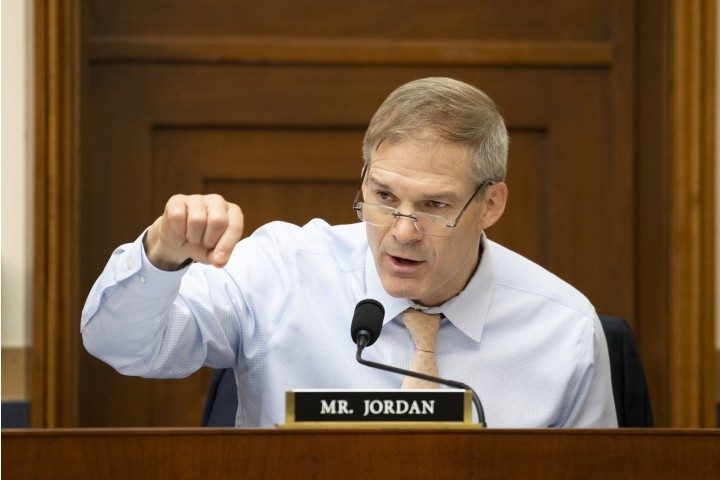
The House Select Committee conducting a probe into the January 6 Capitol protest, which Democrats have frequently labeled an “insurrection,” is now asking Representative Jim Jordan (R-Ohio), an ally of President Donald Trump, to voluntarily sit down with congressional investigators.
In a letter sent to Jordan on Wednesday, the committee argued that he was in regular communication with Trump prior to and after the election.
“We understand that you had at least one and possibly multiple communications with President Trump on Jan. 6. We would like to discuss each such communication with you in detail. And we also wish to inquire about any communications you had on January 5th or 6th with those in the Willard War Room, the Trump legal team, White House personnel or others involved in organizing or planning the actions and strategies for January 6th,” wrote Representative Bennie Thompson (D-Miss.), the committee’s chair.
“Public reporting suggests that you may also have information about meetings with White House officials and the then-President in November and December 2020, and early-January 2021, about strategies for overturning the results of the 2020 election. We would also like to ask you about any discussions involving the possibility of presidential pardons for individuals involved in any aspect of Jan. 6 or the planning for Jan. 6.”
Jordan is the ranking member of the House Judiciary Committee and vice chair of the House Freedom Caucus. He is the second member of Congress to receive a letter requesting to meet with the January 6 Committee.
On Monday, the committee similarly asked for cooperation from incoming Freedom Caucus chair Representative Scott Perry (R-Pa.), who has already said he will not appear before the committee.
“I stand with immense respect for our Constitution, the Rule of Law, and the Americans I represent who know that this entity is illegitimate, and not duly constituted under the rules of the US House of Representatives. I decline this entity’s request and will continue to fight the failures of the radical Left,” the Republican lawmaker said Tuesday.
“The Select Committee prefers to gather relevant evidence from members cooperatively, but if members with directly relevant information decline to cooperate and instead endeavor to cover up, the Select Committee will consider seeking such information using other tools,” a spokesman for the January 6 Committee said in response to Perry’s remarks, seeming to suggest the panel will subpoena the congressman if he does not cooperate voluntarily.
In the letter to Jordan, Thompson appeared to take a peaceful approach by offering to set up a meeting in the Ohio lawmaker’s district.
“When you were asked during a Rules Committee hearing on October 20, 2021, whether you would be willing to share with the Select Committee the information you have regarding Jan. 6 and the events leading up to that day, you responded, ‘I’ve said all along, I have nothing to hide. I’ve been straightforward all along,’” Thompson wrote.
Over the summer, Jordan acknowledged that he spoke to President Trump on January 6, but dismissed the conversation as having to do with organizing an insurrection.
“Yeah I mean — I spoke with the president last week, I speak with the president all of the time. I spoke with him on Jan. 6. I mean, I talked with President Trump all the time and that’s … I don’t think that’s unusual. I would expect members of Congress to talk with the president of the United States when they’re trying to get done the things they told the voters in their district to do,” Jordan told Spectrum News.
On Wednesday, Florida District Judge Mary Scriven denied a request by former Trump National Security Advisor Michael Flynn to place a temporary restraining order against the January 6 Committee and Speaker Nancy Pelosi over subpoenas issued against him.
“Flynn has not set forth specific facts in an affidavit or a verified complaint clearly showing that immediate and irreparable injury, loss, or damage will result to him,” Scriven wrote in her ruling.
The judge also noted that the committee had postponed Flynn’s deposition date to a “date to be determined” and there was “no evidence in the record as to the date by which the select committee now expects Flynn to comply with its document requests.”
Scriven left open the possibility for Flynn to request a restraining order again if his legal team amends the specified issues.




